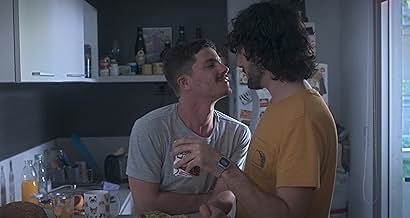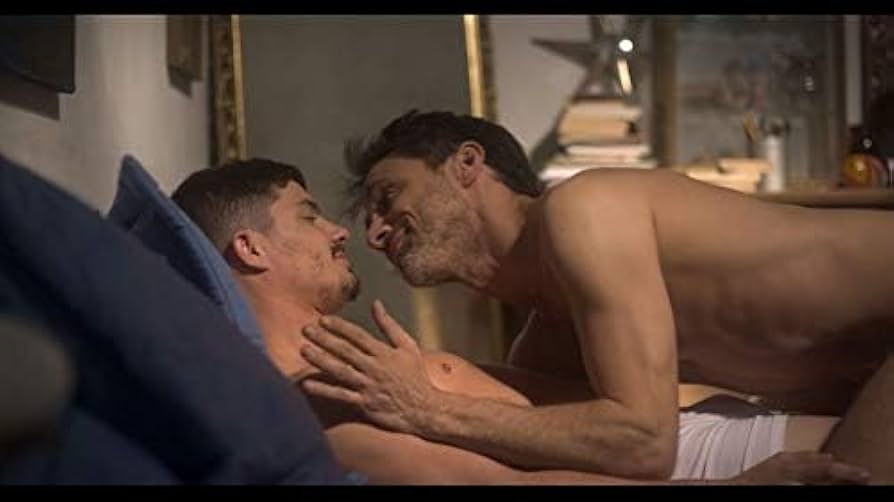A Skeleton in the Closet (2020)
July 7, 2025
A Skeleton in the Closet (2020) – A Heartfelt Coming-Out Tale Drenched in Humor, Secrets, and Love
At first glance, A Skeleton in the Closet may sound like a simple pun—perhaps a lighthearted comedy about hidden truths. But by the end of this warm, funny, and deeply emotional journey, you’ll discover it’s much more: a quietly powerful story about identity, family, fear, and ultimately, acceptance.
This 2020 Argentine film (original title: El Cazador) follows the story of Manuel, a closeted university student who travels back to his hometown to surprise his conservative family. What was meant to be a simple visit turns into an unexpected collision of secrets when he discovers that he’s not the only one hiding something. From its opening moments, A Skeleton in the Closet balances genuine humor with heartfelt tension, carefully walking the tightrope between comedy and poignant social commentary.

Manuel, played with sincere vulnerability by Facundo Gambandé, is a character that instantly wins your empathy. Behind his shy smiles and awkward pauses lies a young man aching to live freely, yet paralyzed by fear of rejection. His decision to come out to his family feels monumental—but when he arrives home unannounced, things quickly spiral in unexpected directions.

The twist? His family is hiding a secret of their own—a flamboyant, eccentric visitor named Lautaro, played with scene-stealing charisma by Patricio Ramos, has taken up residence in their home. He’s open, proud, and utterly unafraid to challenge the norms of this tightly-wound, image-conscious household. As Manuel tries to quietly come to terms with himself, Lautaro’s very presence forces the entire family to confront their own assumptions about sexuality, masculinity, and love.
One of the film’s great strengths lies in its subtlety. It doesn’t preach. It doesn’t rely on melodrama. Instead, it offers moments of quiet tension—a glance held too long, a dinner table awkwardly silent, a father whose pride masks confusion. The film invites us into a home where everyone is performing, and gently asks what would happen if those performances finally stopped.

Director Nicolás Teté captures the mood with a touch of intimacy, using warm lighting and naturalistic dialogue to create a setting that feels lived-in and familiar. The cinematography doesn’t scream for attention, but rather draws the viewer in with its closeness, like a secret being whispered in your ear. The rural backdrop of Argentina adds another layer—an environment both physically open yet socially closed, where whispers travel faster than truth.
The supporting cast is remarkably strong. The parents, caught between tradition and love, provide some of the most emotionally layered moments. The grandmother, wise and observant, offers brief but unforgettable scenes that hint at generational shifts in understanding. But it’s the evolving dynamic between Manuel and Lautaro that forms the heart of the movie—sometimes hilarious, sometimes heartbreaking, and always real.

Lautaro, in particular, is a revelation. He’s not just comic relief; he’s a character forged from fire. His flamboyance is not a mask, but a weapon—against shame, silence, and fear. Through him, Manuel learns not only how to come out, but how to stand tall.
A Skeleton in the Closet never forgets that coming out is not just about saying the words—it’s about reshaping an entire identity, confronting years of internalized fear, and hoping the world won’t shatter in return. It’s about finding your voice in a room full of silence. And sometimes, it’s about realizing that the people you feared most… might surprise you.
By the final act, the film reaches a satisfying emotional crescendo—not in loud declarations, but in small, powerful acts of love and honesty. A hand held across a table. A family photo taken without pretending. A smile exchanged, not forced, but real.

Final Verdict: 9.6/10
Strengths:
- Authentic performances that blend humor and emotion
- A nuanced portrayal of coming out in a conservative family
- Beautiful balance of tension, warmth, and comedy
- Subtle, heartfelt writing with a universally relatable theme
Possible Weakness:
- Viewers expecting high-stakes drama may find its quiet pace too subdued—but that’s also part of its charm
A Skeleton in the Closet is not just a coming-out story. It’s a celebration of truth—awkward, messy, beautiful truth—and the courage it takes to live it out loud. It reminds us that sometimes, the biggest battles aren’t fought in the streets, but in the silence of our childhood bedrooms. And sometimes, the most unexpected people can be the ones who open the door—and finally let us out.

